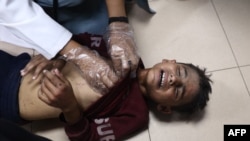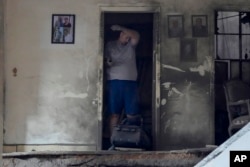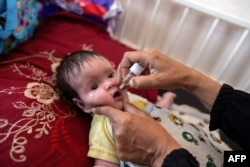United Nations human rights officials warn the widening conflict and military escalation across the Middle East are putting “the lives and well-being of potentially millions of people across the region at risk” and diminishing prospects for peace.
“I’m having trouble finding the right words today to just describe how terrible this situation has been for civilians” on the ground in Lebanon, Gaza, Israel and Syria, Ravina Shamdasani, spokesperson for the U.N. high commissioner for human rights, told journalists at a briefing in Geneva Friday.
“This is going to have an impact that will reverberate across many generations of people in the Middle East,” she said. “Children who have been out of school for so long, children who have had their limbs amputated, who will be living with lifelong injuries, as well as the trauma of the impunity that has marked this conflict, means that it is going to continue to feed cycles of revenge and injustice.”
The Office for the Coordination of Humanitarian Affairs, OCHA, reports more than 2,000 people have been killed and nearly 10,000 injured in fighting in Lebanon over the past year. About one-fifth of those killed were women and children.
According to Lebanon’s Ministry of Public Health, at least 22 people were killed and over 100 injured Thursday night when Beirut was bombed “in the heaviest strike yet on the central part of the city.” Essential civilian infrastructure, including hospitals, clinics, ambulances, schools and housing, reportedly have been destroyed or damaged.
While the Lebanese people are bearing the brunt of this latest phase of conflict, Hezbollah and other armed groups continue to fire rockets into Israel, resulting in the deaths of two people on Oct. 9, “the first civilian fatalities in northern Israel since the most recent escalation of hostilities between Israel and Lebanon last month,” Shamdasani said.
“Amidst this escalating violence, we are appalled by sweeping inflammatory language on multiple sides,” Shamdasani said. “Recent language threatening Lebanese people as a whole and calling on them to either rise up against Hezbollah or face destruction like Gaza” risks being understood as encouraging violence against civilians and civilian objects, “in violation of international law,” she said.
This was a reference to a threat made by Israeli Prime Minister Benjamin Netanyahu during a video address Wednesday.
Shamdasani said that “ongoing denigration of the U.N., in particular UNRWA, is unacceptable. This kind of toxic rhetoric, from any source, must stop.” UNRWA is the U.N. agency that supports Palestinian refugees.
Gaza suffering continues
Meanwhile, the suffering of the population in the Gaza Strip goes on. Gaza’s Ministry of Health reports more than 41,000 Palestinians have been killed, many of them women and children, and 96,600 people have been injured since Israel began its military offensive in the Palestinian enclave a year ago.
The offensive was triggered by the surprise Hamas terror attack on Israel that killed about 1,200 people; some 250 others were taken hostage.
Over the last week, Israel has intensified its military operation in northern Gaza. “We are greatly concerned about the safety of patients and the health workers amid these intensifying hostilities and the current evacuation orders covering Kamal Adwan, Al-Awda and Indonesian hospitals in northern Gaza,” said Dr. Rik Peeperkorn, the World Health Organization’s representative to the occupied Palestinian territories, said on a video link from Jerusalem.
“We had three missions planned over the last week” to assist in the transfer of “critical nonwalking patients from these hospitals,” he said, adding that “none have been successful.”
He said that the mission to Kamal-Adwan hospital was impeded after delays at the checkpoint, and a mission to resupply As-Sahaba hospital with fuel, blood units and medical supplies was denied October 9 and impeded on October 10.
“Kamal Adwan and Al-Awda remain partially functional but are struggling due to shortage of supplies, including blood, trauma disposables and medications for patients with noncommunicable diseases and fuel,” he said, adding that Indonesian Hospital “is no longer able to provide services and accommodate patients.”
Attacks on health care locations
The World Health Organization recorded 18 attacks on health care facilities, resulting in 72 deaths and 40 injuries among health staff since Sept. 17. It reported 96 primary health care centers and health facilities were forced to close in the south due to rising hostilities.
Five hospitals were reported nonfunctional “due to physical or infrastructural damage, and four hospitals were partially evacuated, requiring the transfer of patients,” the WHO said.
Amid this chaos, confusion and multiple challenges, UNICEF and WHO officials said, the second round of emergency polio vaccinations is scheduled to go ahead Monday in Gaza. The first round, held Sept. 1-12, successfully vaccinated an estimated 591,700 children against the crippling disease.
As in the first round, the second round will have three phases, each involving three campaign days and one catch-up day in the central, the south and the north of the Gaza Strip.
“Local teams will be deployed in areas that need special coordination to reach children, including those who could not receive vaccines in the first round. It is critical they are reached,” Peeperkorn said.
Speaking from Jerusalem, Jean Gough, UNICEF special representative, said one of the challenges facing vaccinators is the “endless population movements.”
“Once again, it will be absolutely critical that not only the localized humanitarian pauses are respected in the north, but also that people are not forced to move from one area to the other,” she said. “This will be essential for us to be able to vaccinate at least 90% of children under the age of 10 among the population in the north. We have reassurance from COGAT that these humanitarian pauses will take place.”
She said U.N. agencies overseeing the campaign will be meeting every day with COGAT, an Israeli unit that is responsible for implementing Israel’s civilian and humanitarian policies in the Palestinian territories.
“So, we are confident that the humanitarian pause will continue” throughout the campaign, Gough said. “It worked for round one, and we are confident that it will work for round two.”



